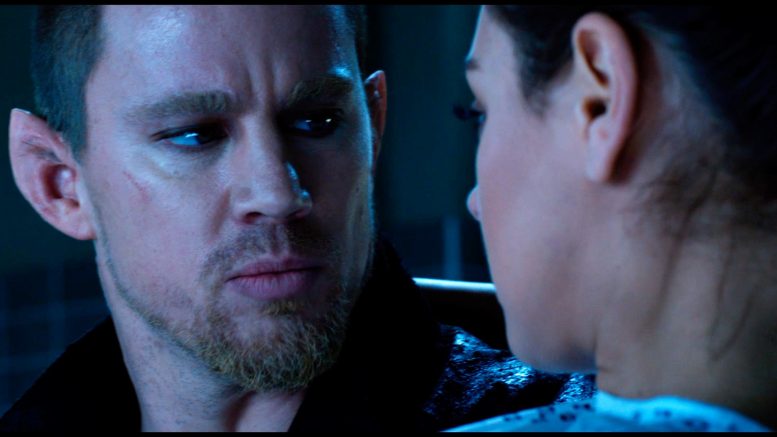By Rafael Abreu
Staff Writer
I love science-fiction. In film, in video games, in literature – it’s my favorite genre.
Whether the story is extremely fantastical or extremely grounded, it’s bound to interest me in some way.
I can forgive bad acting, bad effects and bad story so long as the film’s sci-fi world, lore and tech keep me interested.
It took Lana and Andy Wachowski, the film’s writers, producers and directors, a while to get “Jupiter Ascending” released, and their ambition, with a $175 million movie budget, shows with flying colors.
The film stars Mila Kunis as Jupiter Jones, a long lost decedent of a royal Abrasax family, who is saved by Caine Wise (Channing Tatum), a genetically engineered former-soldier. Jones soon learns about her lineage and is taken on an intergalactic journey involving family, betrayal and, of all things, business.
“Jupiter Ascending” is a visual feast first and foremost–I have never said “cool” so much during a movie.
The effects in this film are nothing short of outstanding and fantastic to look at, though it may prove to be too much for some people.
I absolutely loved all scenes involving anti-gravity boots, make-up laden characters and space itself.
All of the settings in the film are unique and memorable one way or another, from a very urban “cesspool” and a cyberpunk-like refinery to a classic looking kingdom and completely white chapel.
Chicago, the Wachowskis’ hometown, is also well utilized, being the location of Jones’ family and interplanetary battles.
During Wise’s rescue of Jones, they go blasting through downtown, fighting off alien invaders and shooting around skyscrapers. It’s an exhilarating sequence and one of the film’s major highlights.
One of the most impressive aspects of “Jupiter Ascending” is the world building. During the course of the film, I found myself becoming more and more interested in the lore that the Wachowskis presented, especially since it was all their own creation.
All of it seemed fresh, different, unique and fleshed out.
We’ve never before come across these characters and worlds, though they definitely feel like they’ve been around.
The Wachowskis truly know how to create and firmly establish a universe that is both believable and enjoyable, such as their “Matrix” trilogy and recent film “Cloud Atlas.” Jupiter Ascending is a film full of all kinds of details, small and large.
The characters are an interesting bunch, ranging from down-and-out (Sean Bean as Stinger Apini) to brooding-but-interesting (Tatum), as well as ranging from subtle to over-the-top (Tuppence Middleton, Douglas Booth and Eddie Redmayne as Kalique, Titus and Balem Abrasax).
The Abrasax family is a noticeable one, since each sibling is unique and memorable, either for their personalities, environments or both, as their motives are very similar.
Kalique is a subtle person, introducing herself to Jones politely and explaining how certain things in their family’s world works; Titus is a handsome playboy who further fleshes out their world for Jones – and was the one who hired Wise to find Jones – in the first place; and then there is Balem, who serves as the main villain and eldest Abrasax sibling, who’s main goal is to kill Jones and claim complete control over the planet Earth.
Balem to me is such a fun and silly character, because he really is over-the-top: his voice is low and gruff and his mannerisms are effeminate. He’s a good example of a laughably bad and cringe-worthy villain, but those precise criticisms are what for me made him such a great space opera antagonist.
For all the things “Jupiter Ascending” does so well, there is an equal amount of things it does, for lack of a nicer word, poorly.
Most of the film’s flaws come from its script, consisting of a story that is too convoluted and has maybe too much going on in it.
It’s never a good thing when I have to be tracking and re-capping the plot in my head as the film goes along, filling the story with more and more plot.
At least the overall story and themes were made clear to me by the film’s end, but among all that, it can get frustrating trying to understand what’s going on and why.
It is unfortunate that the vision put forth by the Wachowskis came up short when put in motion. It’s all there. The movie can be understood better with repeated viewings, but it should at least be easy to follow when viewed.
“Jupiter Ascending” has so much going on so much of the time that the film doesn’t get the chance to explain every little thing.
However, and this may be wrong of me, I can forgive “Jupiter Ascending” and the Wachowskis.
I can forgive the convoluted plot, occasionally silly dialogue, incomprehensible moments and slight over-indulgence that the film features. Why? Because I love science-fiction.
If nothing else, I have major respect and admiration for the Wachowskis’ vision and ambition.
Because “Jupiter Ascending” is still one of the most original films I’ve seen in years. It may not be perfect, its story might be flawed and the finished result may be unfavorable for many, but for me, it was exactly the kind of sci-fi tale I never get to see.
It was the kind of story that takes cues from fairy tales, the Wachowskis own interests and general fantasy to create a space opera the likes of which never get released, let alone imagined.


Be the first to comment on "Wachowski’s overly ambitious in Jupiter Ascending"